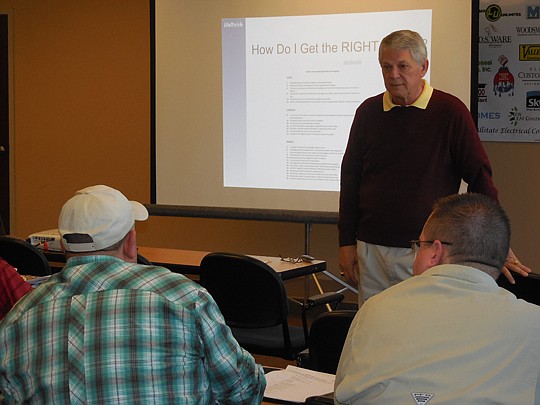
By Kevin Hogencamp, Contributing Writer
With a new federal certification in its arsenal, Jacksonville’s Solid Rock Engineering consulting firm is poised to take its business to the next level.
But the expanded opportunities are accompanied by challenges, including determining how many employees to add in anticipation of growing, says owner Jimmy Johns.
Johns says his need to resolve that conundrum is the primary reason he enrolled in a Northeast Florida Builders Association seminar in January on organizing company processes for maximum profits.
As a U.S. Small Business Administration 8(a) Business Development Program firm due to Johns’ Native American heritage, Solid Rock can compete for federal contracts that have been set aside for small, disadvantaged businesses.
As a result, the 10-employee firm will add new personnel with different skill sets, Johns said.
Johns’ careful deliberation of what positions to create and when to add them is a good move, says Chuck Coker, who conducted the seminar.
Indeed, maximizing efficiencies and profits should always begin with an honest self-assessment, says Coker, whose Jacksonville firm, LifeThrive, provides organizational consulting and training.
“Rightsizing companies isn’t just about firing people,” he said.
Rather, it’s getting the right people in the right jobs, which Coker says is easier said than done.
“You can hire an unbelievably talented person that has the best skills in the industry, but if they don’t fit your culture and can’t interact with your people — turnover,” Coker said, snapping his finger for emphasis.
There’s often collateral damage, to boot.
“That person may have run off other people,” he said.
Coker says “rightsizing” — a term used in the human resources field to describe the process of reorganizing businesses to maximize efficiencies and profits — should begin with self-analysis.
About 25 percent of companies allocate the time and resources necessary for such an assessment, he said.
“You must ask yourself: ‘If I woke up tomorrow morning and all of my problems were solved, what would the company look like?’” he said.
That’s precisely the challenge Solid Rock faces.
“You need to assess what is the right size of the new organization?” Coker told Johns.
He also encouraged Johns to provide the existing workforce with clarity and direction in anticipation of inherent changes in the company’s culture.
“You will have a different dynamic to the day-to-day feel of the company,” he said. “Take steps to articulate those changes to your present group. … This the perfect time to do this.”
For job applicants and existing employees, Coker recommends using questionnaires to measure personality traits, knowledge, abilities and attitudes.
LifeThrive leads its clients through scientifically based processes that Coker says result in improved employee engagement.
He says doing so results in better hiring decisions and — once employees are on the payroll — increased self-esteem, especially in the construction industry.
Coker also is an avid proponent of companies using regular, objective and measurable employee performance appraisals.
Too often, firms invest in marketing or on technology upgrades when they should be devoting those resources on their people, Coker said.
“If you don’t evaluate people for their performance, what happens when they don’t perform?” he said. “How else are you going to adequately assess strengths and weaknesses?”
Procuring services from companies like Coker’s comes at a cost, but the returns are exponential, he said.
“What happens when a person’s self-esteem increases? Their emotional intelligence increases,” he said. “And emotional intelligence is the one thing proven to impact productivity, performance and profitability in an organization more than anything else.”
Coker also encouraged the seminar attendees to take steps to ensure employees understand their roles in contributing to their companies’ success and profitability.
Polling indicates 24 percent of employees feel such an empowerment on the job, he said.
“That means that three out of four people would take another job if was offered — just like that,” he said. “If you know that three out of four people aren’t engaged on the job we have a problem, don’t we?”
Seminar attendee Keith Ward, president of Jacksonville’s Thomas May Construction, said Coker’s advice complements his ongoing efforts to hire and retain quality employees.
“People need to know that they have a future with a company as long as they’re doing their job, especially in the construction industry,” he said.